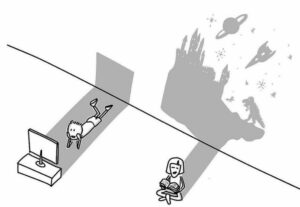Discovering joy in reading at a young age is the foundation for life-long learning.
Books not only teach us language and literacy skills, they teach us empathy, creative thinking, and expand our world by exposing us to ideas, cultures, people, and beliefs beyond our own.
Another thing we are all exposed to more and more today: technology.
With the rise of technology and social media has come a surplus of online reading resources for our children to scroll, click, and swipe through. The magical pages of books look dull and prehistoric compared to the glow of our screens. But while these online storytimes and resources are a great addition to our educational tool belt, they should never be a replacement for the magic of reading real books and physically turning the page.
In fact, limiting our children’s time in front of the screen and preserving the magic of reading “real” books, is perhaps one of the most important things we can do for their development and educational growth.

How Much Screen Time Should My Child Be Getting?
According to The American Academy of Pediatrics, children 18-months and younger should have no screen time (unless it’s to video chat a loved one of course!). Children ages 2 to 5 should have a limit of 1-hour of screen time per day. If this seems like a surprisingly small amount of time, you are not alone in feeling that way. In fact, the average toddler in the U.S. spends over 2-hours per day consuming digital media.
The quality of media your child consumes is also a factor. Is it active and engaging, or passive and distracting? Teaching children healthy boundaries with technology is essential. When those boundaries become blurred, there can be negative effects on your child’s development.
What Are The Negative Effects?
Technology makes children accustomed to “instant gratification” from a very young age. As a result, digital media has proven to lower attention spans and hurt an individual’s ability to think critically and creatively. The digital world moves at the speed of light and we are losing the ability to slow down and consume on a deep level. When our little ones consume too much digital media from a young age, their minds are being shaped in a way that can be detrimental to their ability to learn and create.
How Is Reading The Simple Solution?
Reading physical books with your child is one of the most important things you can do for their social, emotional, and educational development.
Studies have shown that parents and children speak and engage more when reading physical books versus e-books. Physically slowing down to turn the page creates space and time. Your child is more likely to ask questions and engage with the story. Parents and caregivers are more likely to discuss the book with their children and make connections to their own lives. This is essential to not only building literacy skills but building empathy and a sense of identity. It is also vital to nurturing creative minds. Research has proven that the most rewarding literacy experiences occur when physically reading books with our little ones.
What Do We Do At Wise Wonder?
At Wise Wonder, we surround our students with books and stories that they can physically touch: paperback, hardcover, board books, pop-up books, you name it! Storytime in our reading garden is a central part of each class. We read books that have to do with our weekly themes and always encourage children to ask questions, make connections, and share their own stories. Not only are children learning to read and write, but they are also igniting their curiosity, learning to think critically, and deepening their emotional intelligence.
What Can You Do At Home?
- Limit screen time! Whether you have a daily or weekly limit, or certain “no screen” times, ensure that your children are getting plenty of time away from the digital world.
- Keep books in sight and in reach! It’s great having books at home but ensure that they are laid out in a way that is inviting and easy for your children to reach.
- On the flip side, try keeping technology out of sight and reach! Maybe you even have a place in your house where all phones, iPads, etc. get “tucked in” at certain times.
- Practice what you preach. Children learn most by watching and mimicking, so if they see us living with our heads in our screens, they will want to do the same. It’s important to take screen breaks together and normalize shutting down.
Life can be hard and technology is easy to go to. We all have those days when plugging in is the easiest or the necessary option, but remember, nothing compares to snuggling up with your child and getting lost in a story together. Whether it’s in the morning during breakfast, at the park on a sunny day, or tucked under the covers moments before your child’s eyelids droop and they leave the book’s world to enter the world of dreams, find time to read.
In a world where everything moves too fast, these valuable moments are the ones that will most help your child’s growth… and these are the moments you both will cherish.
There is always time to turn the page.

Bibliography
Klass, Perri. “How Children Read Differently From Books vs. Screens.” The New York Times, The New York Times, 16 Mar. 2021, https://www.nytimes.com/2021/03/16/well/family/children-reading-screens-books.html.
Mayo Clinic Staff. “Screen Time and Children: How to Guide Your Child .” Mayo Clinic, Mayo Foundation for Medical Education and Research, 10 Feb. 2022, https://www.mayoclinic.org/healthy-lifestyle/childrens-health/in-depth/screen-time/art-20047952#:~:text=Developing%20screen%20time%20rules&text=If%20you%20introduce%20digital%20media,doesn’t%20work%20as%20well.
Mostafavi, Beata. “Which Books Are Better for Toddlers – Digital or Traditional?” World Economic Forum, 16 Dec. 2021, https://www.weforum.org/agenda/2021/12/print-books-tablets-reading-toddlers-education/.
Prout, Todd. “The Negative Effects of Technology on Children.” National University, 13 May 2021, https://www.nu.edu/resources/negative-effects-of-technology-on-children-what-can-you-do/.
Rapaport, Lisa. “Toddlers Gain More from Printed Books than from e-Books.” Reuters, Thomson Reuters, 26 Mar. 2019, https://www.reuters.com/article/us-health-toddlers-ebooks/toddlers-gain-more-from-printed-books-than-from-e-books-idUSKCN1R72PD.
Western Governors University. “Impact of Technology on Kids Today (and Tomorrow).” Western Governors University, Western Governors University, 25 Aug. 2020, https://www.wgu.edu/blog/impact-technology-kids-today-tomorrow1910.html#openSubscriberModal.
